Tour de la Provence 2025 Preview 🇫🇷
Mads Pedersen dominated this French stage-race last season. The former world champion returns once again, but will the outcome be the same?
The 9th edition of the Tour de la Provence kicks off on February 14th in the Southern French city of Marseille and will conclude two days later in the coastal city of Arles. The race takes place in the Provence region, in southeastern France, hence its name.
The race is organised by the southern French newspaper La Provence, which also served as the race’s title sponsor. As a 2.1 level event on the UCI Europe Tour calendar, the Tour de la Provence attracts a decent amount of WorldTour level teams and also enables the participation and exposure of plenty of French continental level teams.
In the 2025 edition, there will be seven WorldTour level teams, five pro-continental teams, and four French continental teams competing over three stages in the Provence region.
We should see some very interesting racing over the coming days, so dive into this preview to find out more about the riders in attendance and the stages that they will tackle.
Previous Winners
2024 | Mads Pedersen 🇩🇰 | Lidl-Trek
2023 | No Race
2022 | Nairo Quintana 🇨🇴 | Arkéa-Samsic
2021 | Iván Sosa 🇨🇴 | INEOS Grenadiers
2020 | Nairo Quintana 🇨🇴 | Arkéa-Samsic
2019 | Gorka Izagirre 🇪🇸 | Astana
2018 | Alexandre Geniez 🇫🇷 | AG2R La Mondiale
2017 | Rohan Dennis 🇦🇺 | BMC Racing Team
2016 | Thomas Voeckler 🇫🇷 | Direct Énergie
2024 Edition
Last year’s edition was dominated by one man, Mads Pedersen…
The former World Champion won the first three stages en route to the general classification victory too. The race was very different to the previous three editions due to the lack of a mountain stage, hence why the most recent winners before Pedersen were Colombian climbers Nairo Quintana (2x) and Iván Sosa.
GC Podium
Mads Pedersen 🇩🇰 | Lidl-Trek | 11:52:36
Axel Zingle 🇫🇷 | Cofidis | +29 seconds
Raúl García Pierna 🇪🇸 | Arkéa - B&B Hotels | +29 seconds
Stage winners
Prologue | Mads Pedersen 🇩🇰 | Lidl-Trek
Stage 1 | Mads Pedersen 🇩🇰 | Lidl-Trek
Stage 2 | Mads Pedersen 🇩🇰 | Lidl-Trek
Stage 3 | Tom Van Asbroeck 🇧🇪 | Israel - Premier Tech
Race Schedule
Stage 1 | Marseille - Saint-Victoret (175km) | Friday 14 February
Stage 2 | Forcalquier - Manosque (169km) | Saturday 15 February
Stage 3 | Rognac - Arles (197km) | Sunday 16 February
Competitors
The defending champions Lidl-Trek return to the race with a powerful squad illustrating their ambitions to defend the title. Mads Pedersen has been recovering from stomach problems, which saw him abandon Etoile de Bessèges last week. If the former World Champion has recovered well, he can win any/all of the three stages. Whether Mads Pedersen is fit and healthy or not, Lidl-Trek still have a strong squad to call upon. Toms Skujiņš is finally starting to be given his flowers after another brilliant season in 2024. A major win is surely on the horizon for the Latvian rider, who will be aiming to get his 2025 campaign up and running successfully, with stages 1 and 2 suiting him in particular.
Despite being 38, Bauke Mollema is still an extremely valuable rider for Lidl-Trek after a superb 2024 too. Whilst unlikely to win the GC due to the suitability of the stages, you can’t count Mollema out, as he could be in the podium mix. Alex Kirsch and Ryan Gibbons will likely be on lead-out duty for Pedersen, but both would be able to step up in the event of the Dane’s misfortune for a sprint finish.
Matej Mohorič will be eyeing up stage 1, with the tricky descent in the finale being a potential launchpad for the Slovenian. Mohorič should be in the GC mix for Bahrain - Victorious, as could fellow Slovenian Matevž Govekar. In the event of sprint finishes, Govekar will be a big contender for victory, and a big bonus is that he climbs better than a lot of other sprinters. This could lead to a scenario where Govekar may become a GC contender if things fall into place. Fred Wright is another good option for the team to have, and keep an eye out for Nicolò Buratti too.
EF Education - EasyPost will be hoping for success in this race, considering the line-up they have brought. Dutchman, Marijn van den Berg, will be the team’s most likely option of success, as he is another versatile sprinter who can also climb well for a fast man. Like Govekar, a scenario could arise where the Dutchman becomes a GC contender if the race doesn’t blow apart on the opening stage. Jefferson Cepeda, Darren Rafferty, Owain Doull and Samuele Battistella are well suited if the race becomes more selective on stages 1 and 2.
All four of the French WorldTour teams will be quietly optimistic about their chances of success coming into this year’s race.
Groupama-FDJ have surprisingly never won a stage at the Tour de la Provence and will be hoping that can change this year. Paul Penhoët is likely the team’s best bet, as the French sprinter showed promising signs at the Etoile de Bessèges, finishing 3rd and 6th on two stages. Young talent Thibaud Gruel is one to watch this week too.
Equally, Decathlon AG2R La Mondiale Team has had a pretty underwhelming return of stage wins from this race in the past, with only two victories, both claimed by Alexandre Geniez in 2017 and 2018. Whilst no longer at the level of a green jersey winner at the Tour de France, Sam Bennett has shown that he is still capable of winning races in France at a similar level to the Tour de la Provence. Last season, the Irishman won four stages and the general classification at the 4 Jours de Dunkerque. If any stage comes to a sprint finish and Bennett is in position, he will be aiming for the win and no less. Tord Gudmestad, Pierre Gautherat, Sander De Pestel and Dorion Godon are all quick finishers too and will be key parts of the lead out for Bennett. Equally, one of these riders could step up for a sprint if necessary. Godon could also be a GC contender as he is pretty reliable on hilly terrain. This race also marks the start of ex-pro Luke Rowe’s journey as a sports director for Decathlon AG2R La Mondiale Team, after spending his whole racing career at the INEOS Grenadiers.
Stanisław Aniołkowski is a sprinter for Cofidis who isn’t often spoken about, yet the Polish rider finished 2nd on a Giro d’Italia stage last year behind Jonathan Milan. He’s already come close to victory in 2025, finishing 2nd, and winning the bunch sprint behind the late attacker Iúri Leitão at the Trofeo Palma. It would be no major shock to see Aniołkowski pop up in the finale of the stage and take the 6th professional win of his career. Valentin Ferron will be buzzing with confidence after winning the GP Marseille and will be a major contender in the event of a reduced group sprint. Both riders will be hoping that they can become Cofidis’s first stage winner at the Tour de la Provence since Bryan Coquard in 2022.
For Arkéa - B&B Hotels, Ewen Costiou will be hoping that the race becomes very selective on the opening two stages, as on his day, he is one of the best puncheur/climbers in the race. Raúl García Pierna, who finished 3rd on GC last year, is more of a diesel compared to the explosive Costiou, but he is also very capable on hilly terrain too, and could be one to watch once more.
Mathieu Burguadeau has the highest pedigree for Team TotalEnergies, as a former Paris-Nice stage winner and should thrive on the hilly days, with Sandy Dujardin being an outsider for any potential sprint. Mattéo Vercher is also a very combative rider, so keep an eye out for him too. The experienced Pascal Ackermann lines up for Israel - Premier Tech alongside stage winner from last year Tom Van Asbroeck, Jake Stewart and Riley Pickrell too. Matis Louvel could also thrive on the grittier days too.
Other riders to watch out for are Pierre Barbier of Wagner Bazin WB, and Lukáš Kubiš, Jérémy Lecroq of St Michel - Preference Home - Auber93, and Matyás Kopecký of Team Novo Nordisk, in the event of a potential sprint finish. In terms of riders for the GC from smaller teams, Nicolas Breuillard of St Michel - Preference Home - Auber93 could be worth keeping an eye on, after finishing 6th at the Etoile de Bessèges.
Stages
Stage 1 | Marseille - Saint-Victoret (175km)
The opening stage of the 2025 Tour de la Provence kicks off in Marseille and has the most vertical gain of the three stages. It is 175 km long and packed with 2,615 metres of vertical gain across three categorised climbs and plenty of uncategorised climbs. It could prove to be quite a stage, with a plethora of riders who believe they could win. Consequently, it will be a difficult stage to control for the teams who want a sprint finish.
The riders will be tested from the start, with a 4.2km climb up the Col de la Gineste, which averages 5.1%. This should provide the perfect platform for climbers wanting to get into the early breakaway. The climb last featured in a stage of the Tour de France back in 2007, won by the current general manager of Cofidis, Cédric Vasseur. Could that be an omen? Quickly after comes the Pas d’Ouillier, which is 5.6km at 5.5% average and, like the first climb, uncategorised.
The first officially categorised climb of this year’s race is the very long Col de l’Espigoulier, which winds its way up over 11.1km, with an average gradient of 5.2%. This climb has become a regular in the GP Marseille and was used on a stage of Paris-Nice 2022, when French rider Mathieu Burgaudeau burst onto the scene with his first professional victory. Incidentally, this stage could suit the Frenchman if it is raced aggressively. It is safe to say that the sprinters would have preferred an easier opening to the race.
There’s still plenty of climbing on the menu, with the climbs coming thick and fast. The Côte de Mazaugues (5.1km at 5.3%) awaits the riders next and is the second of three categorised climbs. This climb is making its debut in the race, having appeared in three previous editions of Paris-Nice and a stage of the Tour de France in 1993 won by Italian rider Fabio Roscioli. The final categorised climb is the Côte de Belcodère, which is 3.3km at 5.6%, with the summit coming 45.5km from the finish line in Saint-Victorin.
The final 30km of the stage has less climbing compared to the rest of the stage. This means that if any sprinters who have initially hung on but now have been distanced, there should be an opportunity to return to the peloton. A pretty sketchy descent also awaits the riders in the last 15km, and it could become a scenario where fortune favours the brave. If things are all together in the final km, which is perhaps unlikely, there will be a fast and furious finish in Saint-Victorin. However, if the race has split apart on the climbs, we could see a small group fight it out for victory, or perhaps even a solo rider racing to victory.
With the climbing en route, this stage will suit the likes of Mads Pedersen, Matevž Govekar and Marijn Van Den Berg more than the purer sprinters like Sam Bennett and Pascal Ackermann.If the race does become more stretched, expect the likes of Toms Skujiņš, Mathieu Burgaudeau, and Matej Mohorič to be potential animators, with the latter particularly suited to the tricky descent in the finale.
Stage 2 | Forcalquier - Manosque (169km)
Another hilly affair follows the opening stage, with 169km and three categorised climbs on the menu from Forcalquier to Manosque. This stage is almost a carbon-copy of the previous year, with all three climbs returning.
There’s an easier start than the previous day, with the first big climb coming around 38km into the stage. The Col de Buire (2nd cat) is 6.6km long with an average gradient of 3.5%. The terrain remains very hilly after the Col de Buire, but the next categorised climb is nearly 80km away, the Col de Viens (3rd cat), which is 1.3km at 2.9%. The final categorised climb of the day is, on paper, the hardest of the entire 2025 Tour de La Provence. It’s called the Col de 'l’Aire dei Masco and is 6.5km long with an average gradient of 4.8%. This climb could be a key launchpad for attacks and where gaps can be made. There’s still 28km to the finish from the summit of the climb, meaning plenty of racing remains, but expect this climb to be ridden aggressively, as the strongest riders try to whittle down their opponents.
The remainder of the stage is hilly with some kickers including a 1.1km section at 3.9%, twice. With the finish to the stage being an uphill drag, timing will be key in the event of a group sprint in Manosque.
Stage 3 | Rognac - Arles (197km)
Whilst it is debatable whether the other stages will end up in a sprint finish, stage 3 should certainly see the sprinters shine in Arles. If this stage doesn’t end up in this scenario, the sprinters will be kicking themselves. Compared to the other two stages, which both have over 2,400 metres of vertical gain, this stage has only 573 metres. A huge difference. It is also a carbon copy of stage 3 in the 2024 edition, won by Tom van Asbroeck of Israel - Premier Tech, a day littered by crosswinds.
The only categorised climb comes 50km into the stage, the category three Col de la Vayède. It is only 1.1km in length and has an average gradient of 6.5%. This climb has been used on three previous Tour de France stages, all won by legendary sprinters in André Greipel, Mark Cavendish and Robbie McEwen.
At 190km long, it is quite a long stage, meaning that the teams who will be wanting a sprint may have a tedious day ahead in controlling the breakaway for well over 4 hours. The same can be said for the breakaway riders themselves, who will have little incentive to get up the road beyond the KoM.
The wind could once again become a key element of this stage, as there are plenty of exposed sections. Teams will have to be vigilant to avoid getting caught out of any potential splits, and by nature, this will naturally increase the fight for position at the head of the peloton. Ultimately, this could turn a pretty straightforward stage on paper into something a whole lot more stressful.
Thank you for reading, and hope you enjoy the racing ahead!

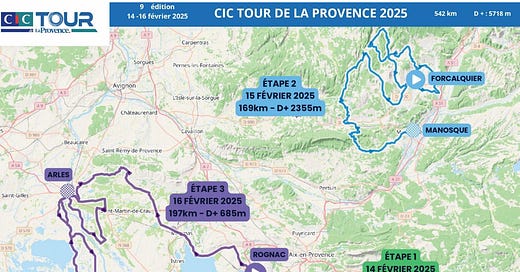




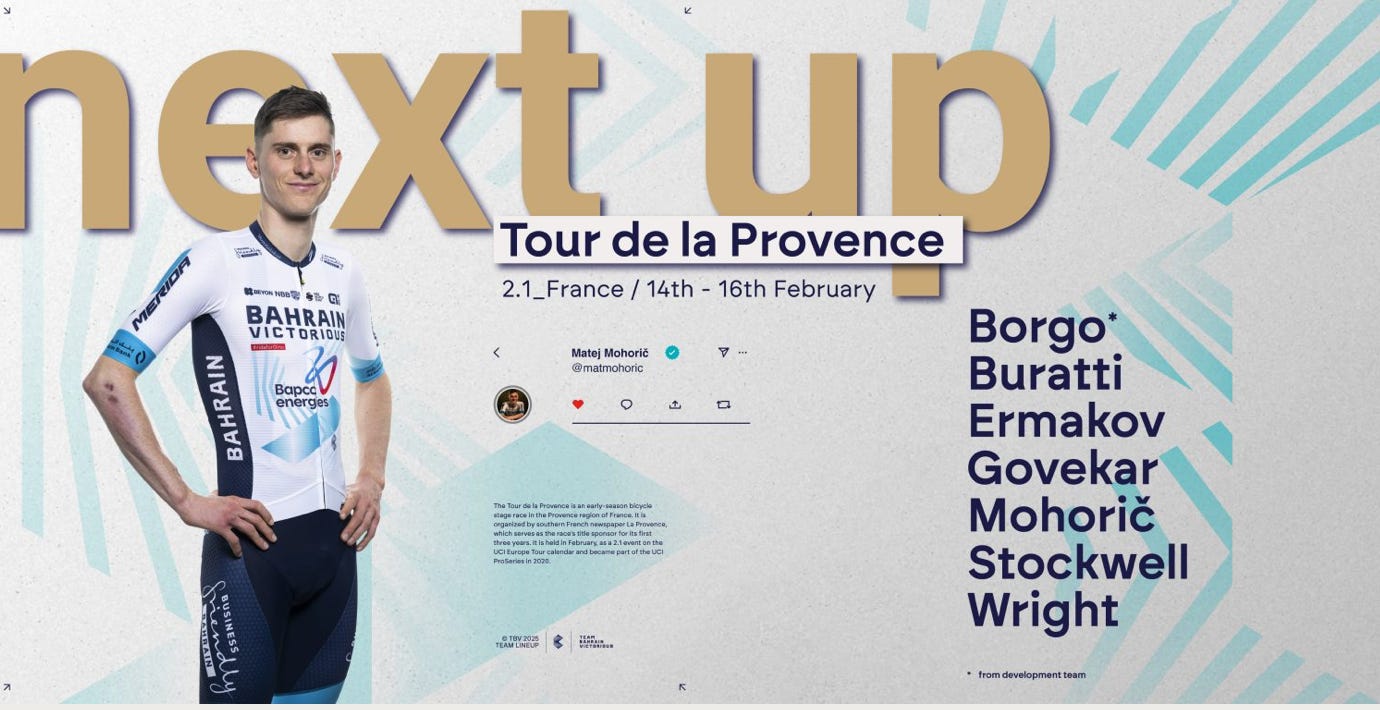
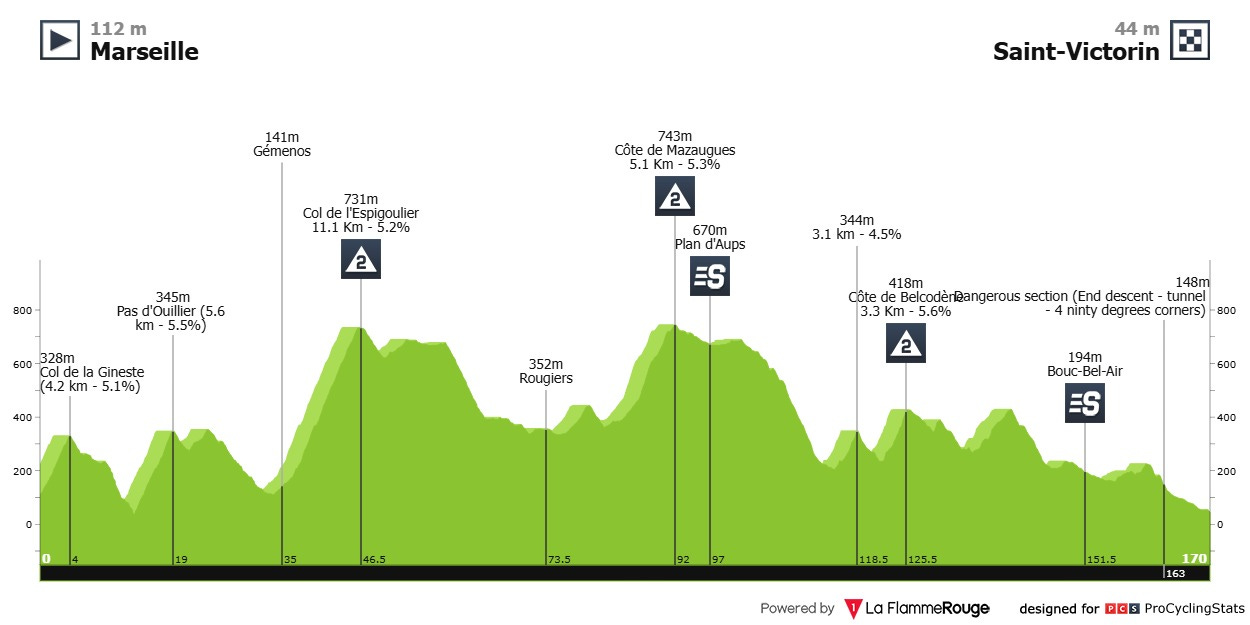
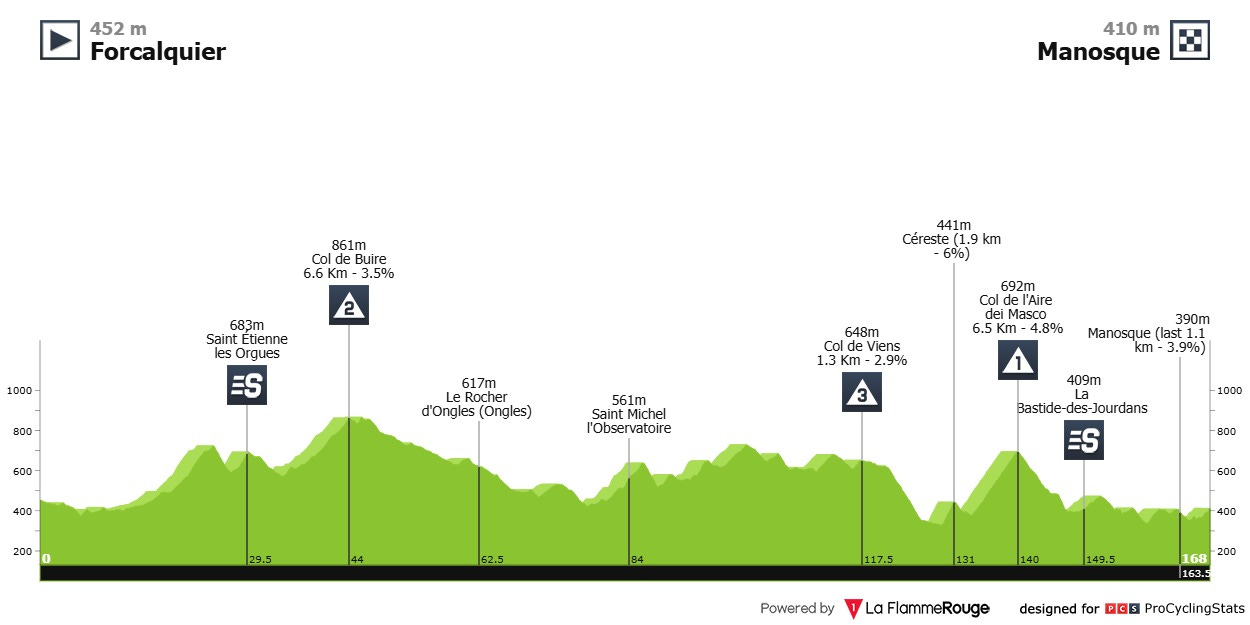
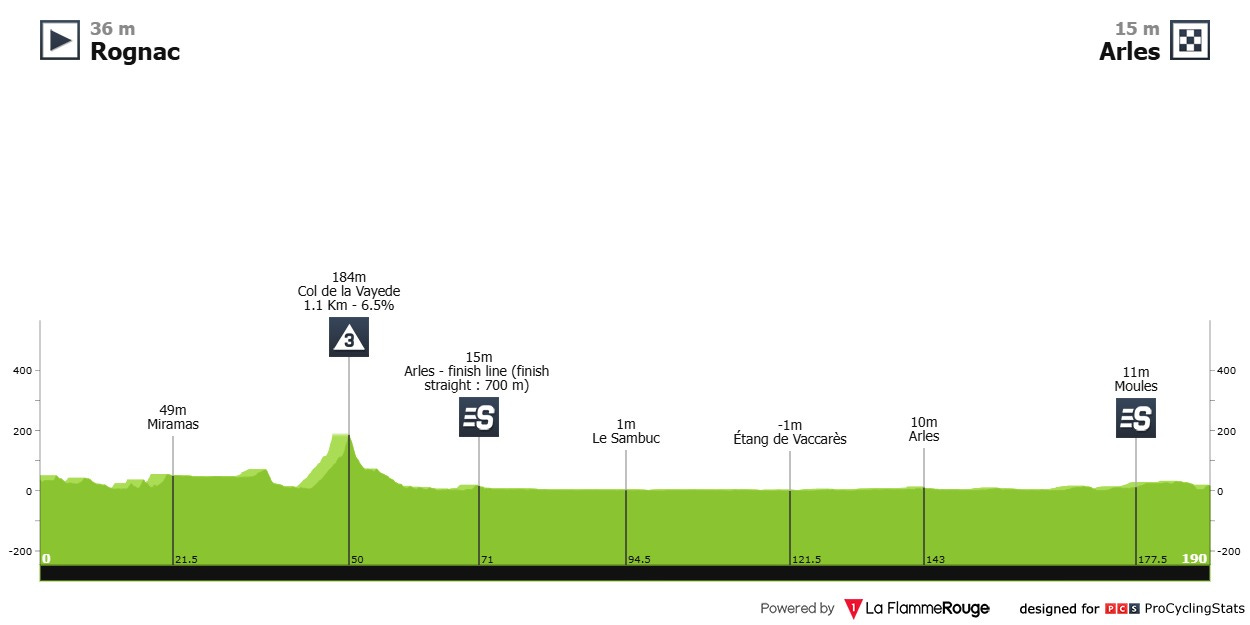
Don't forget about the wind. Especially tomorrow's headwind. The hills will be nullified.
Mads stage 1 (or break)
Mohoric stage 2
Stage 3 - sprint
Gc - Mads
(What’s yours)